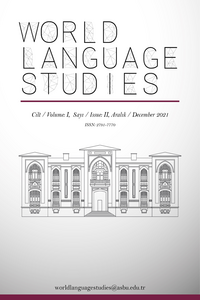Ahlaklı Bir Şair Ve Şairane Bir Yargıç Olarak Robert Henryson: “The Fox And The Wolf” Ve “The Paddock And The Mouse”’Da Şiirsel Adalet
Şiirsel adalet, bir anlatının sonunda iyinin ödüllendirilmesi ve kötünün cezalandırılmasını ifade eden çok tartışmalı bir edebi araçtır. 1677’de Thomas Rymer tarafından nispeten geç türetilmiş olmasına rağmen, kullanımı klasik döneme kadar uzanmaktadır. Terimi savunanlar edebi eserlere etik, öğretici bir bakıç açısı benimsese de çok sayıda eleştirmen edebiyatta böyle bir kullanımın değersizleştirici yönüne işaret etmektedir. Bu makalede, on beşinci yüzyıl İskoç şairi Robert Henryson’ın “The Fox and the Wolf” ile “The Padock and The Mouse” fabllarında bu edebi aracın uygulanışının incelenmesi amaçlanmaktadır. Morall Fabillis, adaletsizlik, günah ve yolsuzlaşmanın hüküm sürdüğü bir dünyayı betimleyen on üç masaldan oluşan bir koleksiyondur. Ancak bahsi geçen masallar, durumun her an kötülerin aleyhine dönebileceğini ima eder. Dolayısıyla bu makalede Henryson’ın şiirsel adaleti seyrek kullanmasının, sürpriz unsuru ve işlenen suçla orantılı ceza tayini yoluyla amaçlanan dersin etkisini artırdığı ileri sürülmektedir.
Anahtar Kelimeler:
Robert Henryson, Fabllar, Şiirsel Adalet, Ortaçağ İskoç Edebiyatı
Robert Henryson As A Moral Poet And A Poetic Judge: Poetic Justice in “The Fox And The Wolf” and “The Paddock And The Mouse”
Poetic justice is a very contentious literary device that refers to rewarding of the good and the punishment of the bad at the end of a narrative. Its use dates as far back as to the classical period despite its relatively late coinage by Thomas Rymer in 1677. The proponents of the term adopt an ethical, instructive perspective to the literary works, although numerous critics point out the devaluing aspect of such a use in literature. In this article, it is aimed to analyse the fifteenth-century Scottish poet Robert Henryson’s implementation of the literary device in the fables of “The Fox and the Wolf” and “The Paddock and the Mouse”. Morall Fabillis is a collection of thirteen fables that depicts a world reigned by injustice, sin, and corruption. However, the aforementioned fables imply that the tables can anytime be turned against the wicked. Therefore, in this article, it is argued that Henryson’s sparse usage of poetic justice heightens the effect of the intended moral through the element of surprise and designation of punishment in proportion to the committed crime.
Keywords:
Robert Henryson, Fables, Poetic Justice, Scottish Medieval Literature,
___
- Abrams, M. H. (1999). A Glossary of Literary Terms (7th ed.). Boston, MA: Heinle & Heinle. Fox, D. (1987). [Introduction]. In R. Henryson (Author) & D. Fox (Ed.), Robert Henryson: The Poems (pp. Ix-Xvi). Oxford: Clarendon Press. Gaard, G. (2014). What's the Story? Competing Narratives of Climate Change and Climate Justice. Forum for World Literature Studies, 6 (2), 272-291. Gopen, G. D. (1987). [Introduction]. In R. Henryson (Author) & G. D. Gopen (Ed), The Moral Fables of Aesop (pp. 1-30). Paris: Univ. of Notre Dame Press. Gray, D. (1979). Robert Henryson. Leiden: Brill. Greentree, R. (1993). Reader, Teller and Teacher: the Narrator of Robert Henryson's Moral Fables. Frankfurt am Main: Peter Lang. Horace. (1942). Horace: Satire, Epistles, Ars Poetica (H. R. Fairclough, Trans.). Cambridge, MA: Harvard University Press. Hannah, S. (2018, April 12). It's No Mystery That Crime is the Biggest-selling Genre in Books. The Guardian. Retrieved September 28, 2021, from https://www.theguardian.com/books/booksblog/2018/apr/12/mystery-crime-fictionbestselling-book-genre-sophie-hannah Hartley, L. (2005). Physiognomy and the Meaning of Expression in Nineteenth-Century Culture. Cambridge: Cambridge UP. Henryson, R. (1987). Robert Henryson: The Poems (D. Fox, Ed.). Oxford: Clarendon Press. Kaul, S. (2008). Poetik der Gerechtigkeit Shakespeare - Kleist. Munschen: Fink. Kertzer, J. (2010). Poetic and Legal Fiction. Cambridge: Cambridge UP. King James Bible. (2008). Oxford: Oxford University Press. Levi, A. W. (1976). Literature as a Humanity. The Journal of Aesthetic Education, 10 (3), 45- 60. Retrieved September 23, 2021. Lyall, R. J. (2005). Henryson, The Hens and the Pelagian Fox: A Poet and the Intellectual Currents of His Age. In Older Scots Literature (pp. 83-94). S. Mapstone (Ed.). Edinburgh: John Donald. Mann, J. (2009). From Aesop to Reynard: Beast Literature in Medieval Britain. Oxford: Oxford UP. Nussbaum, M. (1997). Poetic Justice: The Literary Imagination and Public Life. Boston, MA: Beacon Press. Plato. (1997). Republic (D. S. Hutchinson, Ed.; G. M. Grube, Trans.). In Plato: Complete Works (pp. 971-1224). J. M. Cooper (Ed.). Indianapolis, IN: Hackett Publishing Company. Rymer, T. (1677). The Tragedies of the Last Age Consider'd and Examin'd by the Practice of the Ancients and by the Common Sense of All Ages in a Letter to Fleetwood Shepheard, Esq. London: Gray's Inn. Schrader, R. J. (1980). Some Backgrounds of Henryson. Studies in Scottish Literature, 15 (1), 124-138. Shipley, J. T. (1954). Dictionary of World Literature: Criticism - Forms - Technique. NewYork, NY: Philosophical Library. Zach, W. (1986.). Poetic Justice: Theorie und Geschichte einer literarischen Doktrin. Niemeyer: Tübingen. Zirker, A. (2016). Poetic Justice: A Few Reflections on the Interplay of Poetry and Justice. Connotations: A Journal for Critical Debate, 25 (2), 135-151. Retrieved October 11, 2021, from https://www.connotations.de/article/angelika-zirker-poetic-justice-a-fewreflections-on-the-interplay-of-poetry-and-justice/
- Başlangıç: 2021
- Yayıncı: Ankara Sosyal Bilimler Üniversitesi
